The Symbiosis of Sports Massage and Sports Psychology: A Holistic Approach to Mental and Physical Performance

With the advancement of sports sciences, it has become increasingly evident that exceptional athletic performance is not merely the sum of physical efforts and technical skills. Instead, it is a complex system in which the close cooperation of physical and mental factors plays a decisive role. The relationship between sports massage therapists and sports psychologists is not merely complementary but symbiotic. Their collaboration profoundly impacts athletes’ recovery capabilities, stress management, and ultimately their performance. This article explores how the joint efforts of these professionals transform athletes’ lives both on and off the field.
The Scientific Foundations of Mind-Body Unity
Neurophysiological Connections
Sports massage and psychological interventions exert their effects through shared biological mechanisms. The pressure techniques used during massage stimulate peripheral nerve endings in the skin, leading to the activation of the parasympathetic nervous system. This process reduces cortisol levels (the stress hormone) while boosting the production of endorphins, serotonin, and dopamine. These same neurotransmitters play a key role in the effectiveness of sports psychology techniques such as autogenic training and visualization. An Israeli study found that post-massage anxiety levels decreased by an average of 28%, while concentration abilities improved by 19%.
Psychosomatic Feedback
Physical treatments also affect cognitive functions: reduced muscle tension enables athletes to interpret their bodily signals more accurately. A case study in Budapest revealed that 67% of athletes reported improved focus during training sessions after combined massage-psychological treatments. Sports psychologists utilize this physical relaxation to deepen mental training strategies, such as goal-setting techniques.
Integration Points Between the Two Fields
Stress Management and Recovery
Instrument-Assisted Soft Tissue Mobilization (IASTM) techniques employed by sports massage therapists not only accelerate muscle fiber regeneration but also influence the hypothalamic-pituitary axis. Restoring hormonal balance allows sports psychologists to work more effectively on athletes’ emotional resilience. According to a South African study, combined treatments reduced pre-competition anxiety by 41%.
Performance Optimization
Improved blood circulation and lymphatic flow achieved through sports massage enhance oxygen supply and optimize brain function. This physiological effect is complemented by sports psychology methods like cognitive behavioral therapy, which refines decision-making processes. A 2024 American study demonstrated that integrating these two fields increased athletes’ tactical decision-making accuracy by 23%.
Post-Injury Rehabilitation
In treating strains and partial muscle tears, sports massage therapists focus not only on physical recovery but also on psychological aspects such as preventing re-traumatization. A Hungarian study found that combined methods shortened recovery times for severe injuries by 35%.
Practical Synergies Between Techniques
Visualization and Myofascial Release
The “Peak Form Mentally Too” program developed at mTm Studio uniquely combines massage techniques (e.g., bamboo massage) with mental training exercises. For example, during myofascial release, athletes actively visualize their goals while the treatment enhances neural communication. This method increased the effectiveness of visualization exercises by 31% in test groups.
Biofeedback-Based Massage
Some progressive institutions (e.g., Denver Sports Massage) use tools that measure athletes’ stress parameters (HRV, skin conductivity) in real-time during massages. Sports psychologists analyze this data to tailor mental training programs more precisely. Athletes using this method reached desired relaxation states 27% faster.
Challenges and Ethical Considerations
Defining Boundaries
While close collaboration between these two fields is beneficial, it is crucial to clarify competency boundaries. A sports massage therapist cannot assume a psychotherapeutic role, just as a sports psychologist must understand the mechanisms of physical treatments. Ethical guidelines from the Budapest Sports Medical Center emphasize maintaining continuous communication between these professionals for effective collaboration.
Addressing Individual Needs
For kickboxers and Muay Thai fighters, aggression management may take priority, whereas for football players, improving team dynamics might be more critical. Sports massage therapists adjust pressure intensity and target isolated muscle groups accordingly, while psychologists tailor mental exercises to individual needs.
Future Perspectives
Neuroplastic Effects
Recent research examines how regular sports massage affects brain structures (e.g., hippocampus, amygdala) over time. Theoretically, reducing chronic stress and improving sleep quality could induce neurogenesis, significantly impacting learning processes and motor memory.
Digitalization and Telemedicine
Some clinics are experimenting with virtual reality-based massage therapy, where athletes simultaneously undergo psychological training alongside physical treatments. This method shows promise for remote athletes who frequently travel between competitions.
The relationship between sports massage therapists and sports psychologists is not merely professional collaboration but a scientifically grounded symbiosis that opens new dimensions in performance optimization. The interaction between neurochemical responses triggered by physical treatments and psychological interventions creates opportunities for comprehensive athlete development. In the future, this integration will play an even greater role in enabling athletes to handle the challenges of competitive sports both physically and mentally.
In Hungary (especially in Budapest), an increasing number of institutions (e.g., mTm Studio, Sports Medical Center) are adopting this holistic approach, demonstrating its effectiveness for both amateur and professional athletes.
Thomas Bach Complex Sports Regeneration and Mental Therapist
Fedezzen fel többet mTm Sportmasszázs Stúdió-tól
Iratkozzon fel, hogy a legfrissebb bejegyzéseket megkapja e-mail-címére.
